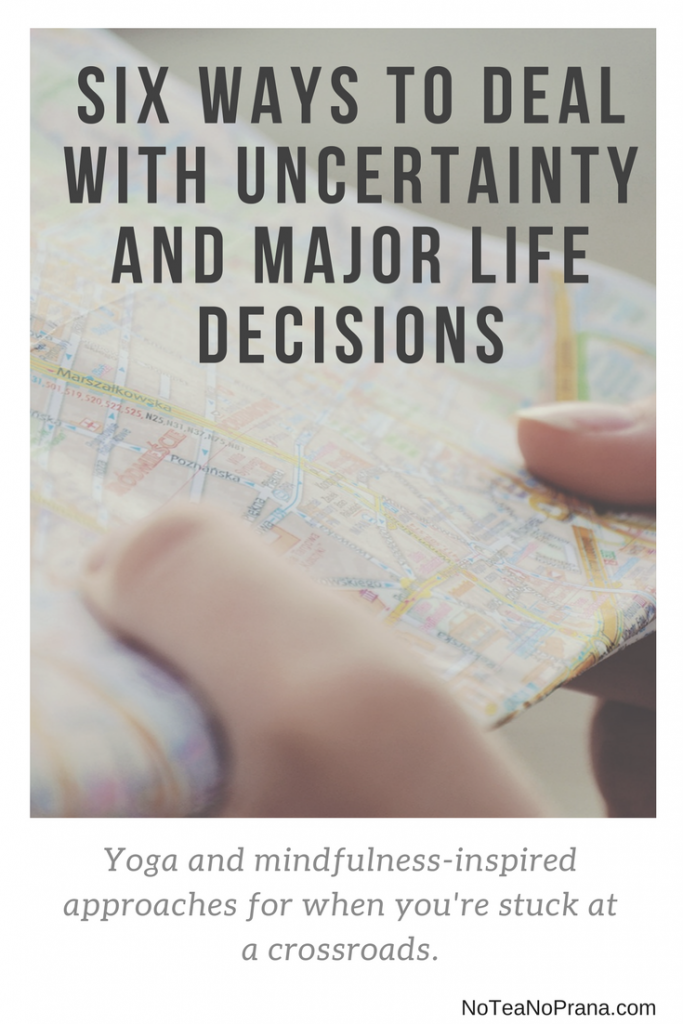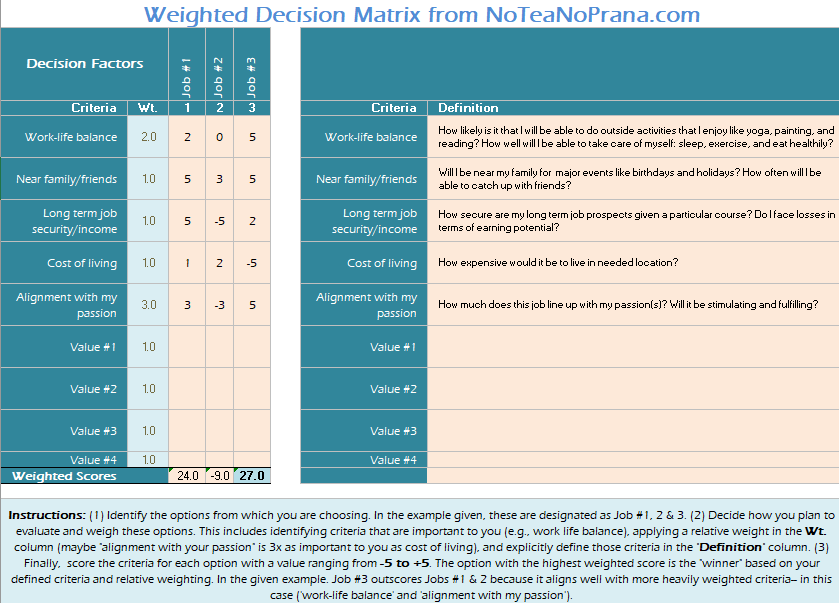
In my main job as a scientist and an academic, I’m struggling with what comes next after I complete my Ph.D. this spring. At different points in our lives, we may all struggle with periods of transition and uncertainty. I’m such a Type A person that I start to go into a tailspin when I don’t have a perfect orderly plan. Of course, that’s not how life really works, even the best laid plans don’t turn always turn out the way we envisioned, and sometimes the best moments in life are totally spontaneous.
In many ways, my yoga practice has helped me deal with this type of uncertainty and those heavy periods of transition. Here are some yoga, mindfulness, and even engineering-inspired tactics that I’m employing as I face my own struggle of not necessarily knowing what comes next in my life and with making some tough decisions about what that life might look like. I hope you find them useful too.
1. Prioritize self-care During times of Uncertainty
Maybe this seems obvious, but make sure that you’re still taking care of your basic needs and maybe even pamper yourself a little bit with a special treat like curling up by the fire with a favorite book or watching a few episodes of your favorite show. When I’m struggling with a big decision or uncertainty, I find that it’s easy to fall out of my usual routine. Go out of your way to cultivate healthy habits: get enough sleep, prepare healthy meals, and make time for regular exercise (extra points for yoga and/or meditation).
2. Avoid decision fatigue
Speaking of routines, try to eliminate the myriad of small decisions that arise on a daily basis. Establish a daily pattern that helps you eliminate quandaries that seem simple, but when added up can cost you a lot of critical brainpower (like when you spend fifteen minutes deciding whether to go the gym before breakfast or after work). In my case, I like to review the upcoming week the weekend before, so that I can streamline any decision making about my schedule and where to fit in majorly important and less important tasks or events.
3. Build in time for solitude and stillness as part of your daily ritual
This might be different for everybody– but try to identify how you can make space for you mind to relax, and find some distance from all the messages that we are bombarded with daily (social media, advertisements, and even opinions from family and friends). This might mean going for a walk someplace green. It could mean taking a long luxurious bath. Maybe lighting some candles and savoring an aromatic cup of tea would serve you best. It might mean moving with intention and noticing all your senses as you engage in a menial, but repetitive and soothing task like washing the dishes. A cathartic run or some other intense cardio could also serve this purpose. To each, their own.
4. Develop or strengthen your meditation practice
Speaking of stillness, are you meditating? I know, I know. Usually, the more stressed I am and the more uncertain I feel, the less I feel like meditating. Because let’s be honest, sitting with all those whirling thoughts and emotions is really hard. I try to make time for at least 5 minutes of meditation practice. Some days it’s more, some days it’s less. Most traditional practitioners would argue that it’s not enough. Unfortunately for me, if I set more stringent demands on my time, it tends to not happen at all. Even five minutes with my breath can ground me in the present moment and bring me back from the hurly-burly extremes of my thoughts.
5. Clarify Your Logic
We all make decisions through individual processes, and we might weigh our feeling/intuition and logic/analytical sides quite differently. However, I find it useful to go ahead an map out the logic. Sometimes that determines the decision for me, but sometimes it simply clears the way for me to make the decision from a place of intuition.
Pro/con list– This is a very standard option that may come to mind when making decisions. It might help to write the pros and cons for each option that you have. It might also be helpful to simplify your decision making to: (1) the pros of changing, (2) the cons of changing, (3) the pros of staying your current course, and (4) the cons of staying your current course.
Decision matrix– this is a more complex process that assigns different weights to multiple criteria for each choice. I was first exposed to this during an engineering course for idea generation and product design, but it works great for life decisions too, especially if you have a quantitative bent.

Get your free decision matrix template
6. Practice Isvara Pranidhana
The last niyama (sometimes translated as ‘positive duties’ or ‘observances’) of the Yoga Sutras is called Isvara Pranidhana, which roughly translates to “faith in a higher power.” But yoga doesn’t define this higher power for us. It could be the commonly held Western perception of a single God, it could also be multiple gods, faith in the universe around us, faith in humanity, or maybe even just faith in yourself. Ekhart Yoga has a great explanation of Isvara Pranidhana here.
For me Isvara Pranidhana is also tied into the concepts of letting go and surrender. Whether you believe that “everything happens for a reason” or not, we all have to acknowledge that we can only control so much in our lives, regardless of how much we plan or how much we fight against it. Sometimes outside events intrude, and sometimes stuff just happens.
I’m not going to lie; this whole concept is hard for me. I’m a scientist by training, so you already know I’m a big fan of empirical evidence. And to be honest, my faith in a higher power comes and goes. However, when I did my first yoga class audition, I shared a quote from Jack Kerouac’s On the Road:
“They have worries, they’re counting the miles, they’re thinking about where to sleep tonight, how much money for gas, the weather, how they’ll get there– and all the time they’ll get there anyway.”
I think it helps to look back on previous periods of uncertainty and major decisions in our pasts. It’s easy to over-analyze in the moment and just become stuck with the apparent immensity of our decision’s impact.
So tap into your Isvara Pranidhana, even if it’s just faith in yourself to make the best decision with the information that you have available right now. You’ve got this!
How have overcome or handled uncertainty in your own life? Share your experiences in the comments below.
This post contains affiliate links. These links provide commissions to support my blogging efforts with no additional cost to you.
